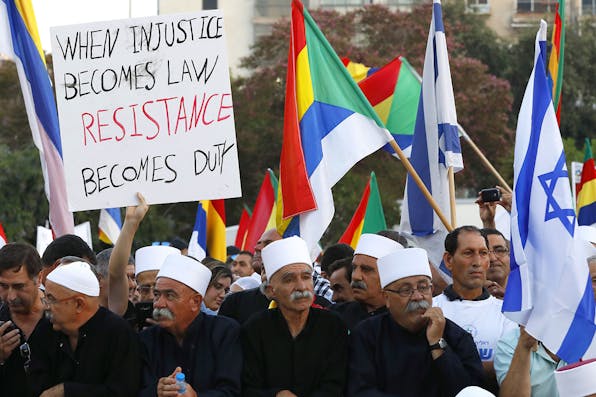
October 31, 2018
The Criticisms of Israel’s Nation-State Law Are Very Strange
Some of the people who now criticize the law were for it only a few years ago.
We are grateful to all four respondents to our essay in Mosaic on Israel’s nation-state law. Since each of them addresses a different aspect of the issue, we’ll reply individually in the order in which they were published.
We are sympathetic to the point made by Haviv Rettig Gur that ambiguity in state policy is often a virtue. Such ambiguity can allow delicate issues to be elegantly skirted, render subtle but useful inconsistencies palatable, and leave room for gradual adaptation to changing circumstances. We take issue, however, with Gur’s further claim that the nation-state law makes explicit some previously—and healthily—unspoken understanding, and thereby undermines it.
In fact, nothing could possibly be more explicit and more universally understood than the simple fact that Israel is the nation-state of the Jewish people. This fact is manifest in precisely the ways enumerated in the law, which merely gives special legal standing to that understanding; it reveals no secrets. Furthermore, to the degree that significant forces exist that are seeking to change Israel’s status as a Jewish nation-state, the failure to anchor this status in law has been a luxury that Israel can no longer afford.
Responses to October ’s Essay

October 2018
What the Druze Know about Israel that Israeli Jews Have Forgotten
By Haviv Rettig Gur
October 2018
Is Israel’s New Nation-State Law Abnormal? Hardly.
By Jeremy Rabkin
October 2018
Will the New Nation-State Law Tempt Israel’s Supreme Court to Overstep its Powers Again?
By Peter Kagan
October 2018
Here’s Why So Many Are Outraged by Israel’s Nation-State Law
By Einat Wilf, Shany Mor
October 2018
The Criticisms of Israel’s Nation-State Law Are Very Strange
By Moshe Koppel, Eugene Kontorovich